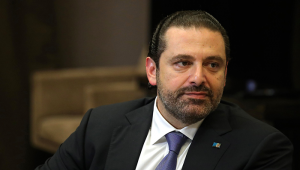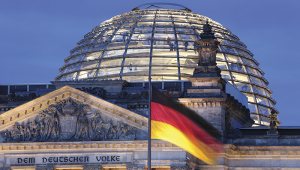The protesters – some waving army flags and wearing fatigues – breached barbed wire around the parliament building in Beirut where MPs were voting on the budget on Friday.
The angry scenes were the latest in a series of demonstrations and strikes by public servants against planned austerity measures in one of the world’s most heavily indebted countries.
Lebanon’s fragile unity government under the new prime minister Saad al-Hariri is trying to agree ways to reduce the fiscal deficit – 11.2% of GDP in 2018 – by reducing public spending.
Government spending is dominated by the public-sector wage bill, debt servicing, and generous subsidies paid to the state energy provider.
A draft budget submitted by the government to parliament includes a cut in veterans’ benefits and a freeze on early retirement from the military.
However, although parliament has been reviewing the proposals, it has yet to make a decision on where the deepest cuts will fall.
Retired soldiers have also picketed the Central Bank building in Beirut – whose own workers have threatened strikes against any effort to cut their pay.
Lebanon has experienced sluggish growth since 2011 and an influx of refugees from war-torn Syria has further strained public finances.
Public debt is equivalent to about 150% of GDP – one of the highest debt-to-GDP ratios in the world – and the Hariri government’s draft proposals seek to cut the deficit to below 9%.
Reducing the deficit is seen by outside observers as a test of Hariri’s determination to reform the economy and gain access to billions of dollars of international infrastructure financing.
Last year Lebanon won pledges of low-interest loans and aid worth more than $11bn at the CEDRE conference held in Paris to rally international support for an investment programme on condition that the country satisfies tough economic and fiscal terms.
The IMF has called for the country to improve debt sustainability and implement fiscal reforms to boost growth.














